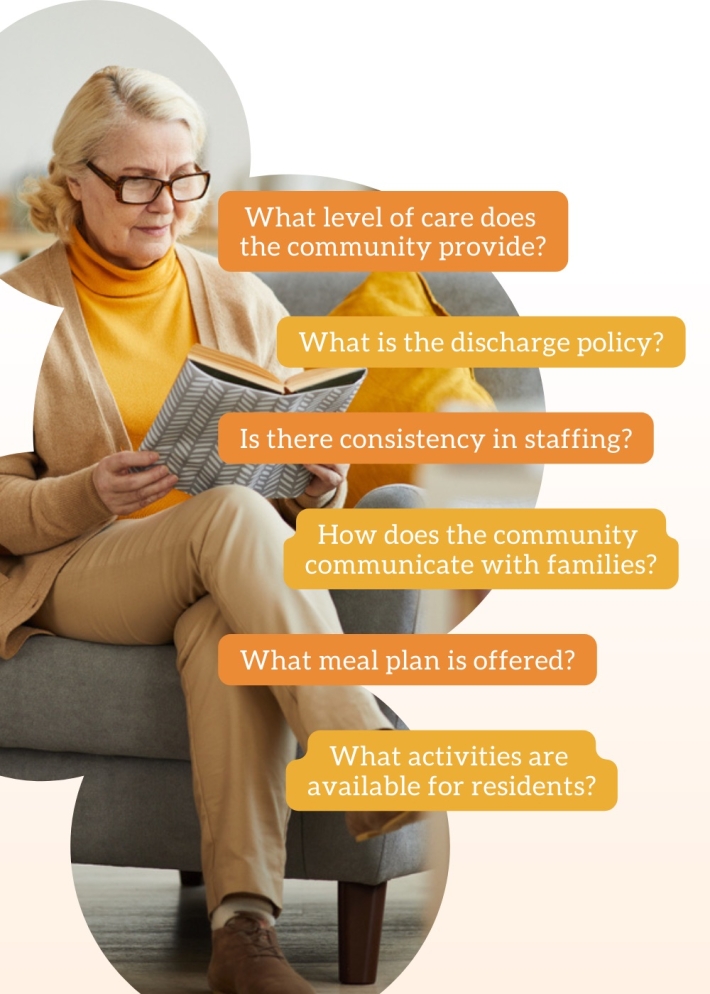9 Questions to Ask Memory Care Communities
We provide a list of questions you should ask a memory care community to help your loved one find the care best for them.

Explore:
If you’ve made the decision to look for a memory care community for your mom or dad, you’re probably feeling mixed emotions. Part of you may feel relieved to have help with the physical, emotional and psychological demands of caring for someone with impaired memory. But you may be feeling anxious, too — will your parent feel comfortable and receive the best possible care? As you tour memory care facilities, asking the right questions can help you determine which community would best suit your loved one. Here are nine questions to ask at a memory care community to help you make the best possible choice:
- What level of care does the community provide?
Memory care communities typically offer assistance with daily tasks such as bathing, dressing and managing medications. But what happens if your parent’s health changes or they need nursing services? Are there RNs or LPNs on staff and are they available 24/7? Is there a visiting physician? What about on-site physical or occupational therapists? - What is the discharge policy?
There are several reasons a memory care resident may be discharged from a community. Perhaps the level of care they need exceeds what the community can offer, or they may become aggressive and pose a danger to themselves and others. Knowing the community’s policies will give you a solid understanding of the extent of the care they are able to offer so you’re not taken by surprise if discharge becomes necessary. - Is there consistency in staffing?
Having the same staff members regularly assigned to care for your parent can lead to more personalized care. Plus, you’ll feel more confident your parent’s needs are being met if you have a consistent point of contact when you have questions or concerns. Ask about the staff turnover rate, too. Job longevity can point to a positive work environment for staff which can foster pleasant surroundings for your loved one. You’ll also want to find out the ratio of staff to memory care residents. The lower the ratio, the better the community will be able to create a safe, person-centered environment for your parent. - What training does staff receive?
People with dementia or cognitive impairment may be prone to wandering or may become aggressive, confused or agitated. Staff who participate in ongoing professional training will be better prepared to deal with these behaviors. Find out if staff are required to attend training that keeps them up to date with current best practices in memory care. - How does the community communicate with families?
Regular communication with caregivers will help ensure your parent is getting the attention they need. You’ll want to know who to contact regarding your parent’s daily care and who to talk to if you feel issues aren’t being properly addressed. Also, ask how often you’ll receive updates on your parent’s health and how frequently you’ll meet with staff to review your parent’s care plan. - What meal options are offered?
Most memory care communities offer three nutritious meals a day, plus snacks. If your parent has special dietary needs or requests, such as gluten free or kosher meals, find out if their needs can be accommodated. - What activities are available for residents?
Activities involving the arts, games, physical exercise and social interaction can boost mood and slow the progression of dementia. Find out about the schedule of activities available to memory care residents. You’ll want to see a variety of activities, including supervised outings, scheduled morning through evening so your loved one has both structure and a feeling of engaged purpose. - How much does the memory care community cost?
Although the cost varies based on location, memory care can be expensive because more staff is required. And prices may increase if your parent needs a higher level of care or specialized services such as diabetic injections or incontinence care. Another question to ask memory care communities about is the pricing structure. Is there an entrance fee? What’s included in the monthly service fee? And how will the cost be affected if your parent eventually needs more care? - What does your gut say?
This last question is for you to ask yourself. No matter how well-appointed or well-recommended a memory care community is, trust your instincts to help you find the community that’s right for your parent. If you don’t like the way a community smells or aren’t drawn to the staff members you meet, make a note of it. You’re looking for a community that instills confidence that your parent will be safe, comfortable and well cared for.
Looking for More Information?
Equipped with this list of questions to ask at memory care communities, you’re ready to begin your search for the best possible environment for your parent. But you probably still have many questions and concerns. Where You Live Matters is a senior living resource offering research-based, unbiased guidance on senior living topics. Consider exploring our database of articles on finding appropriate care for a loved one with dementia or learning more about advancements in memory care technology.
Where You Live Matters is powered by the American Seniors Housing Association (ASHA), a respected voice in the senior housing industry. ASHA primarily focuses on legislative and regulatory advocacy, research, and educational opportunities and networking for senior living executives, so they can better understand the needs of older adults across the country.
